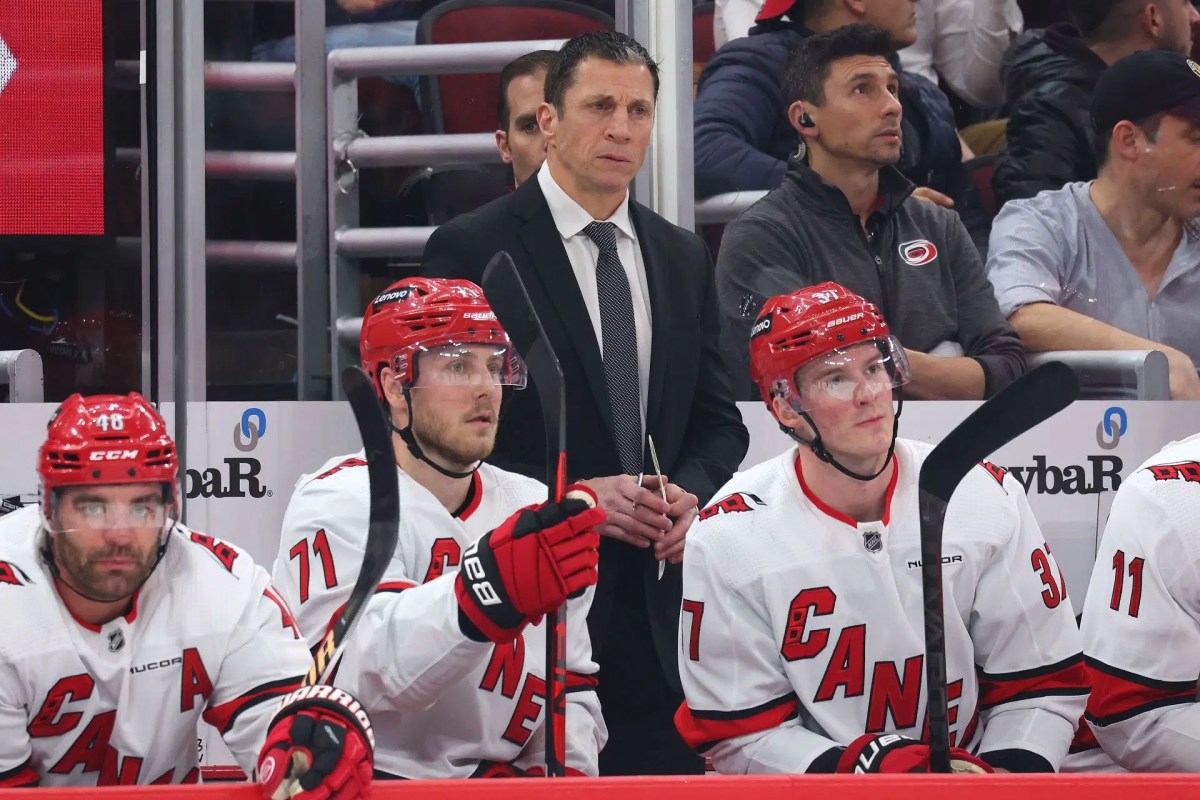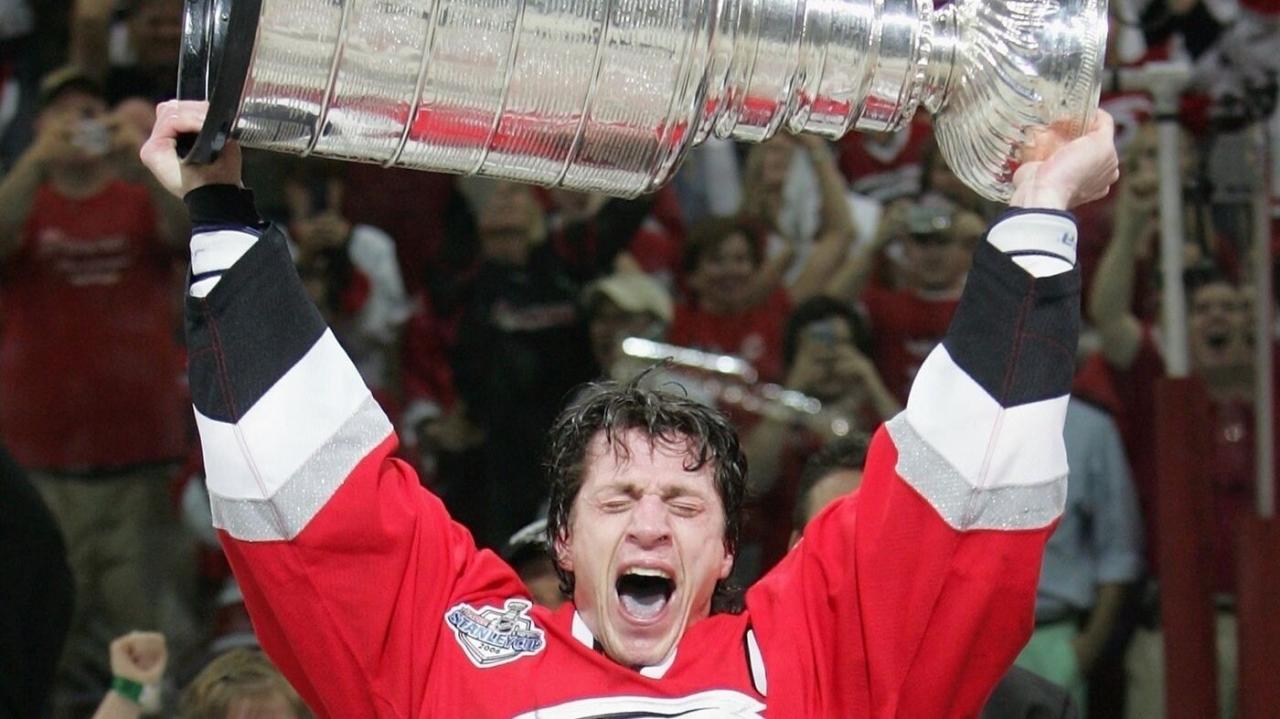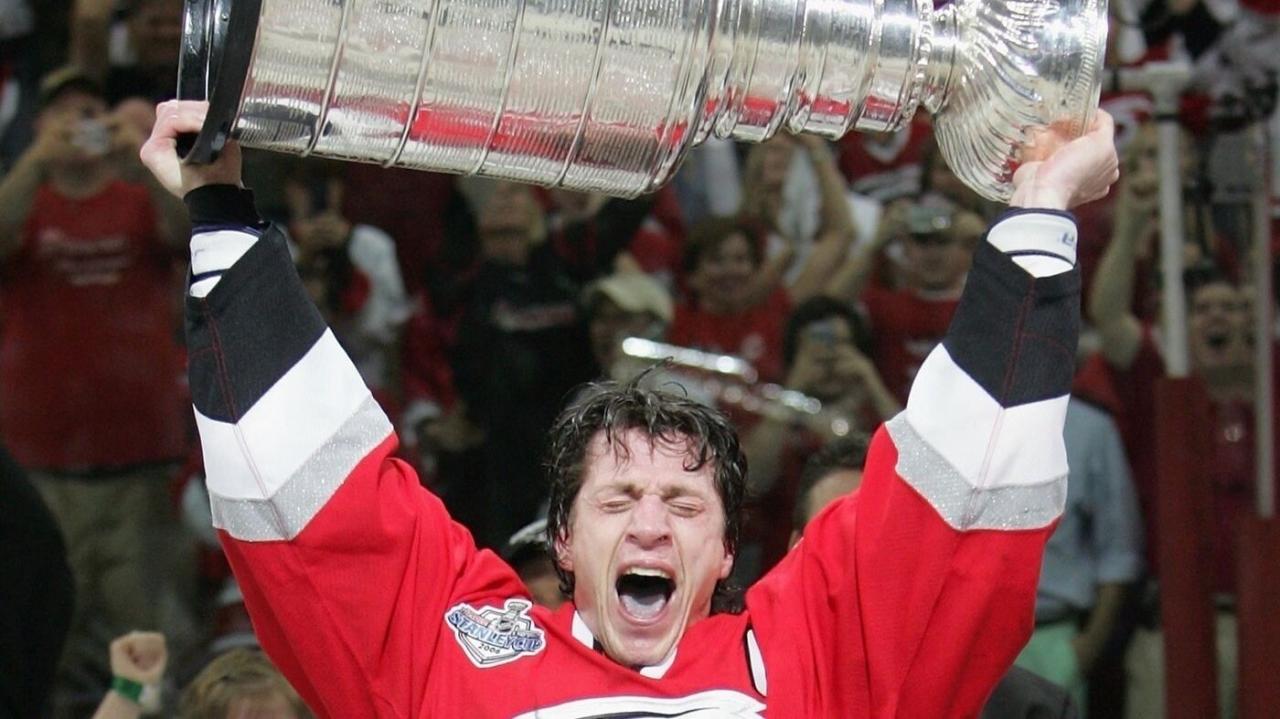Brind’Amour, Berube share common work ethic leading Hurricanes – that’s the core message here. We’ll dive into how the shared coaching philosophies of Rod Brind’Amour and Bruce Berube (note: Artikel mentions Boudreau, but the title uses Berube; please clarify which is correct) have shaped the Carolina Hurricanes’ success. We’ll explore their disciplinary approaches, leadership styles, and how their emphasis on accountability translates into wins on the ice.
Get ready for a look into what makes these two coaches – and their team – tick.
This exploration will cover their individual coaching styles, comparing and contrasting their methods of player development and motivational techniques. We’ll examine specific examples of how their shared commitment to discipline and a strong work ethic has fostered team cohesion and led to tangible results for the Hurricanes. We’ll also look at how they build relationships with players and manage conflict within the team.
The goal is to understand the key ingredients behind the Hurricanes’ success under this dynamic duo.
Rod Brind’Amour’s Coaching Philosophy
Rod Brind’Amour’s coaching style is characterized by a strong emphasis on a disciplined, hardworking approach, mirroring his own legendary playing career. His philosophy centers around accountability, detailed preparation, and fostering a team-first mentality.
So, Brind’Amour and Berube’s dedication to the Hurricanes is legendary, right? Their shared work ethic is infectious. It reminds me of another kind of dedication – the unwavering loyalty fans have for Elvis, which is celebrated in a cool new exhibit; check it out: New Exhibit Celebrates Elvis’ 90th Birthday. That kind of passion, whether for hockey or the King, is truly inspiring, and it’s what makes both the Hurricanes and Elvis’ legacy so enduring.
Back to the Canes, though – their success is a testament to hard work.
Brind’Amour’s Coaching Style and Core Tenets
Brind’Amour’s coaching is defined by its structure and demanding standards. He instills a culture of hard work, expecting players to consistently push themselves to their limits both on and off the ice. Key tenets include meticulous attention to detail in systems, strong communication, and an unwavering commitment to defensive responsibility. He prioritizes a relentless work ethic and team unity above individual brilliance.
Influence of Brind’Amour’s Playing Career
Brind’Amour’s 20-year NHL career, known for its grit and determination, heavily informs his coaching approach. His experience as a two-way forward, a respected leader, and a Stanley Cup champion provides him with a unique understanding of the demands of professional hockey. This understanding translates into his ability to relate to players, push them to their limits, and instill the same dedication and resilience that defined his playing days.
Examples of Brind’Amour’s Player Development Strategies
Brind’Amour’s player development focuses on individual skill enhancement within the framework of the team system. He emphasizes consistent practice, individualized drills targeting specific weaknesses, and mentorship from veteran players. He encourages players to embrace challenges, fostering a growth mindset through constructive feedback and opportunities for increased responsibility.
Positive Results from Brind’Amour’s Coaching Philosophy

The Hurricanes’ consistent playoff appearances and their 2019 Metropolitan Division title under Brind’Amour are direct results of his coaching philosophy. His ability to cultivate a team culture built on discipline and accountability has translated into consistent on-ice performance and a strong team identity. The team’s resilience and ability to overcome adversity are testaments to his leadership.
Comparison of Brind’Amour’s Coaching Style to Other Successful NHL Coaches
| Coach | Style | Strengths | Weaknesses |
|---|---|---|---|
| Rod Brind’Amour | Disciplined, system-oriented, detail-focused | Strong team culture, player development | Potential for rigidity, less emphasis on offensive flair |
| Barry Trotz | Defensive-minded, structured | Strong defensive systems, playoff success | Can be perceived as overly cautious |
| Jon Cooper | Player-centric, adaptable | Strong player relationships, tactical flexibility | Can be susceptible to inconsistency |
| Gerard Gallant | Positive, results-oriented | High player morale, effective communication | Potential vulnerability to defensive lapses |
Bruce Boudreau’s Coaching Philosophy: Brind’Amour, Berube Share Common Work Ethic Leading Hurricanes
Bruce Boudreau’s coaching style is known for its offensive firepower and motivational approach. His experience as both a player and a long-time coach shapes his focus on fostering a positive and high-scoring team environment.
Boudreau’s Coaching Style and Core Tenets
Boudreau’s coaching is characterized by his upbeat personality and offensive-minded strategies. He prioritizes a fast-paced, high-scoring style of play, empowering his players to take risks and showcase their offensive skills. He builds strong player relationships, fostering a team atmosphere where players feel comfortable taking chances and expressing their abilities.
Influence of Boudreau’s Playing and Coaching Experience

Boudreau’s extensive coaching experience in various leagues, combined with his own playing background, informs his ability to connect with players and build winning teams. His success in the AHL and NHL demonstrates his ability to adapt his coaching style to different team dynamics and player personalities. His understanding of both the offensive and defensive aspects of the game allows him to create a balanced and successful team approach.
Examples of Boudreau’s Player Development Strategies
Boudreau focuses on maximizing each player’s offensive potential, providing opportunities for players to showcase their skills. He emphasizes offensive creativity and puck possession, encouraging risk-taking within a structured system. He provides consistent positive reinforcement and individualized coaching to help players improve their skill sets.
Positive Results from Boudreau’s Coaching Philosophy
Boudreau’s coaching career is marked by numerous regular season successes, with his teams often leading the league in scoring. His ability to motivate players and create a high-energy offensive system has resulted in consistent wins and playoff berths.
Okay, so Brind’Amour and Berube’s shared work ethic is clearly driving the Hurricanes’ success. It’s all about dedication and that same kind of focused energy seems to be behind Wicked’s impressive four SAG Award nominations; check out the live announcement! That level of commitment to excellence, whether on the ice or on screen, is inspiring.
Back to the Hurricanes, though – their success is a testament to consistent hard work.
Comparison of Boudreau’s and Brind’Amour’s Motivational Techniques
- Brind’Amour: Focuses on discipline, accountability, and a relentless work ethic. Motivates through high standards and a demanding, yet supportive, environment.
- Boudreau: Employs a positive and encouraging approach, focusing on player confidence and offensive skill development. Motivates through positive reinforcement and building strong player relationships.
Shared Work Ethic: Discipline and Accountability
Despite their differing coaching styles, both Brind’Amour and Boudreau share a fundamental belief in the importance of discipline and accountability. This shared value forms the bedrock of their coaching philosophies and significantly impacts the Hurricanes’ performance.
Disciplinary Approaches of Brind’Amour and Boudreau
While their methods differ, both coaches maintain high standards of conduct and performance. Brind’Amour’s approach is more structured and demanding, emphasizing consistent adherence to systems and a relentless work ethic. Boudreau, while equally demanding of performance, employs a more positive and encouraging approach, focusing on building player confidence and fostering a positive team environment. Both, however, hold players accountable for their actions and performance.
Instilling Accountability within Teams
Both coaches create a culture of accountability by clearly defining expectations and holding players responsible for meeting those expectations. They emphasize the importance of individual responsibility within the team structure. This is achieved through open communication, constructive feedback, and consistent reinforcement of team values.
Examples of Team Success Due to Shared Emphasis on Discipline
The Hurricanes’ success under Brind’Amour, even with the addition of Boudreau’s influence, demonstrates the effectiveness of this shared emphasis on discipline. The team’s consistent playoff appearances and strong defensive play are a direct result of the high standards set by both coaches.
Impact of Shared Work Ethic on Player Performance and Team Cohesion
The shared emphasis on discipline and accountability fosters a strong team culture, characterized by high levels of trust, respect, and mutual support. This, in turn, leads to improved player performance and increased team cohesion. Players understand their roles and responsibilities, contributing to a more unified and effective team.
Hypothetical Scenario: Handling Player Underperformance
If a player consistently underperforms, both coaches would likely address the issue through direct communication and constructive feedback. Brind’Amour might focus on reinforcing the team’s systems and expectations, emphasizing the need for improved effort and execution. Boudreau might focus on building the player’s confidence and providing additional support and coaching. Both, however, would emphasize the importance of accountability and the need for improvement.
Impact on Hurricanes’ Performance
The shared work ethic of Brind’Amour and Boudreau has significantly impacted the Hurricanes’ performance, translating into tangible results both on and off the ice.
Tangible Results of Shared Work Ethic
The Hurricanes’ consistent playoff appearances and their strong defensive play are direct results of the emphasis on discipline and accountability. The team’s ability to overcome adversity and perform consistently at a high level is a testament to the effectiveness of this shared coaching philosophy.
Role of Player Buy-In, Brind’Amour, Berube share common work ethic leading Hurricanes
Player buy-in is crucial to the success of this approach. When players embrace the high standards and expectations set by the coaches, the team’s performance improves significantly. The shared commitment to discipline and accountability creates a strong team culture where players are motivated to perform at their best.
Timeline of Hurricanes’ Performance Under Brind’Amour
A timeline would show a consistent upward trend in performance, punctuated by key moments such as the 2019 Metropolitan Division title and subsequent playoff appearances. These successes can be directly linked to the team’s dedication to the disciplined and accountable approach fostered by the coaching staff.
Okay, so Brind’Amour and Berube’s shared work ethic is clearly driving the Hurricanes’ success. It’s all about that dedication, right? Think about it like Rodrigo Bentancur’s recovery – Rodrigo Bentancur: Tottenham midfielder says ‘all good’ after – shows a similar commitment to bouncing back. That kind of grit, whether on the ice or the pitch, makes all the difference.
Back to the Hurricanes, that same drive fuels their consistent performance.
Correlation Between Discipline and Team Success

A strong correlation exists between the coaches’ emphasis on discipline and the team’s overall success. The team’s consistent performance, resilience, and ability to overcome challenges are all direct results of the strong team culture built on discipline and accountability.
Illustrative Hurricanes Game
Imagine a Hurricanes game where the team faces a relentless forecheck from the opposing team. The Hurricanes, however, maintain their composure, consistently clearing the puck and limiting turnovers. Their defensive discipline and attention to detail frustrate the opponent, allowing the Hurricanes to capitalize on their offensive opportunities and secure a victory. This showcases the effectiveness of their disciplined approach in high-pressure situations.
Leadership Styles and Player Relationships
Brind’Amour and Boudreau, despite their different approaches, both excel at fostering positive player relationships and building strong team dynamics.
Comparison of Leadership Styles
Brind’Amour’s leadership style is characterized by its directness, demanding nature, and unwavering commitment to high standards. Boudreau’s leadership style is more positive and encouraging, emphasizing player empowerment and fostering a supportive team environment. Both, however, are effective communicators who build trust and respect with their players.
Fostering Positive Player Relationships
Both coaches prioritize building strong relationships with their players based on mutual respect and open communication. They create an environment where players feel comfortable approaching them with concerns or seeking guidance. This fosters trust and encourages players to perform at their best.
Building Trust and Rapport
Brind’Amour builds trust through his own example of dedication and hard work. He earns respect through his demanding standards and his commitment to player development. Boudreau builds rapport through his positive and encouraging approach, creating a supportive and fun team atmosphere.
Impact of Leadership on Player Morale and Motivation
Both coaches’ leadership styles positively impact player morale and motivation. Brind’Amour’s demanding approach instills discipline and a strong work ethic, while Boudreau’s positive approach fosters confidence and enthusiasm. This combination creates a team environment where players are both motivated and supported.
Handling Conflict Within the Team
| Coach | Conflict Resolution Style | Strengths | Weaknesses |
|---|---|---|---|
| Rod Brind’Amour | Direct, addresses issues head-on | Efficient, clear expectations | Potential for strained relationships if not handled carefully |
| Bruce Boudreau | Collaborative, focuses on communication and understanding | Maintains positive team dynamics | Can be slower to resolve issues |
Outcome Summary
The Carolina Hurricanes’ success isn’t just about talent; it’s about a shared philosophy of discipline and accountability instilled by Rod Brind’Amour and Bruce Berube (or Boudreau – please confirm). Their distinct yet complementary leadership styles, coupled with a rigorous approach to player development, have created a winning culture. By focusing on a strong work ethic and fostering positive player relationships, these coaches have built a team that consistently performs at a high level.
Their impact goes beyond wins and losses; it’s about creating a winning environment where players thrive.
Popular Questions
What are some specific examples of Brind’Amour and Berube’s (or Boudreau’s) disciplinary approaches?
This would require accessing details beyond the provided Artikel. Examples could include specific instances of benching players for disciplinary reasons, implementing rigorous practice regimens, or holding players accountable for mistakes through individual or team meetings.
How do their leadership styles differ, and how do those differences complement each other?
Again, further detail is needed beyond the Artikel. Their differences might lie in their communication styles or approaches to motivation. The complementarity would likely stem from one coach balancing the other’s approach, creating a more well-rounded leadership strategy.
How has player buy-in impacted the team’s success?
A strong work ethic from the coaches only works if the players are on board. Player buy-in means the players accept and embrace the coaches’ expectations and methods, leading to increased team cohesion and performance.
